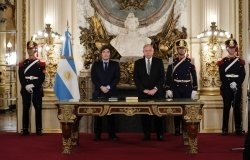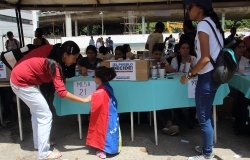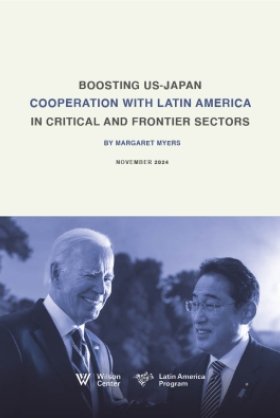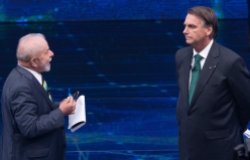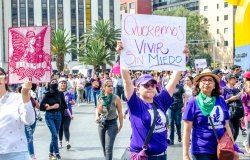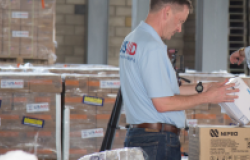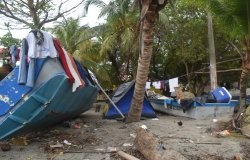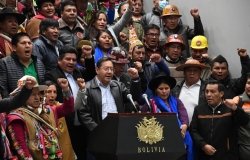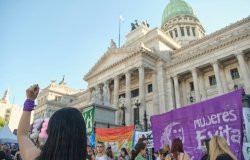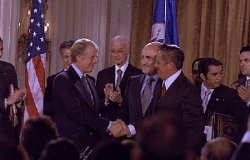Honduras Election: Moving Beyond the Left-Right Divide
"Hondurans go to the polls on Sunday to elect a new president and Congress. While elections in this very poor Central American country of roughly 8 million are not generally the focus of international concern, this time there are issues at stake that sound off alarms far beyond its borders," writes Eric Olson in The Miami Herald.
Hondurans go to the polls on Sunday to elect a new president and Congress. While elections in this very poor Central American country of roughly 8 million are not generally the focus of international concern, this time there are issues at stake that sound off alarms far beyond its borders.
Honduras lived through a coup in 2009, making Sunday the first election since with full political participation. The social turmoil, political polarization, and instability resulting from the coup fractured the traditional party system and further weakened the country’s ability to deal with its economic and security challenges. This gives criminal networks even greater opportunities to operate with impunity. The U.S. State Department estimates that 87 percent of drug flights from South America first land in Honduras.
The homicide rate, long a major concern, is the highest in the world and 4 times higher than Mexico’s. Honduras also faces enormous economic challenges — borrowing money to pay current expenses and, at times, failing to pay its teachers and doctors. Not surprisingly, polls show voters are just as concerned about the economy and jobs as they are about security.
At the heart of Honduras’ troubles is the fragility of its institutions. Corruption and inefficiency are not new, but organized crime and youth gangs have essentially taken control of parts of government, local municipalities, and neighborhoods in and around major cities, including the capital.
They have hollowed out the ability of the police and justice system to function. A June internal audit found that the national police was paying thousands of “ghost” police officers who did not exist. Worse, networks of corrupt police are engaged in kidnapping and extortion schemes.
Sadly, instead of addressing these problems, many want to define this election as a choice between followers of Venezuela’s late President Hugo Chávez and the 2009 coup leaders. In so doing, they obfuscate the failure of successive governments to address the country’s fundamental problems — lack of transparency and accountability.
No government, from the left or right, can restore the rule of law and effectively fight crime and violence in Honduras until the underlying building blocks of a democratic society are repaired. As long as Hondurans cannot put aside their differences to focus on these basics, Honduras will continue to suffer. Sadly, an attempt by the Organization of American States to promote a common security platform amongst competing political parties was weakened last month when the governing party’s candidate refused to sign the document agreed to by everyone else.
For its part, the State Department has wisely signaled that the United States is willing to work with whoever wins, assuming the election is conducted in a reasonably free and fair manner. The U.S. government can also play a positive, if limited, role in supporting the formation of a transparent and accountable government in Honduras, but it must make sunlight a greater priority.
Institutional reform is difficult, especially in a country with a long tradition of weak rule of law, corruption, and special treatment for elites. A first step to break this cycle would be for Honduras to create (with the U.S. backing) an inspector general function or special prosecutor to investigate and hold authorities accountable for corruption, like paying “ghost” police officers.
These prosecutors not only need technical capacity, but protection, and the assurance that judges will act. Independent audits of campaign expenditures, something not required under current law, are also essential. Recent moves by the U.S. Treasury designating Hondurans under the “Drug Kingpin” act are important, but insisting on greater openness in the banking system would be even better.
My wife and I lived in Honduras in the mid-1980s at a time when Honduras was awash in refugees, “Contras,” and guns. Corruption was rampant.
We lived it on a daily basis. Thirty years later, the global context may have changed but the underlying issues of corruption, poverty and inequality, injustice and ineffective governance remain unchanged, or have gotten worse. It is time to refocus on what is really important in Honduras, to move beyond the right-left divide to ensure that democratic governance and accountability are the foundation upon which a prosperous and secure Hondurans can be built.
About the Author

Eric L. Olson
Director of Policy and Strategic Initiatives, Seattle International Foundation

Latin America Program
The Wilson Center’s prestigious Latin America Program provides non-partisan expertise to a broad community of decision makers in the United States and Latin America on critical policy issues facing the Hemisphere. The Program provides insightful and actionable research for policymakers, private sector leaders, journalists, and public intellectuals in the United States and Latin America. To bridge the gap between scholarship and policy action, it fosters new inquiry, sponsors high-level public and private meetings among multiple stakeholders, and explores policy options to improve outcomes for citizens throughout the Americas. Drawing on the Wilson Center’s strength as the nation’s key non-partisan policy forum, the Program serves as a trusted source of analysis and a vital point of contact between the worlds of scholarship and action. Read more
